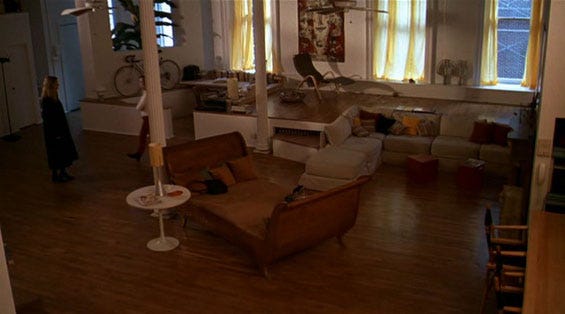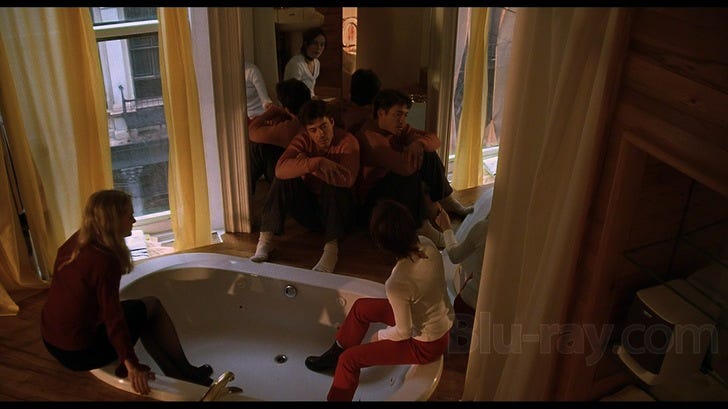In October of 2017, the Los Angeles Times reported that indie director James Toback had been accused of sexual assault or harassment by 38 women, including several well-known actresses. This was the same month the Weinstein article dropped at the New York Times, and like Weinstein, the depth and scope of Toback’s crimes were startling, but the overall sentiment was not. Toback had long cultivated a reputation as a womanizer. He even made a film about it, 1987’s The Pick-Up Artist, starring a young Robert Downey, Jr, as a more handsome, charming version of himself.
The allegations suggested a line between womanizing and harassment that was blurry enough for a predator to get away with sexual violence for years. Most of the women claimed Toback had met them in public, flashed his Director’s Guild card at them, and suggested they get together to discuss an upcoming project, often at a late hour and in a secluded location.
For decades, this was known and tolerated as “the casting couch,” but by 2017, the world had wised up a little. After the article ran, close to 400 women contacted the paper claiming to have been assaulted by Toback. The director responded that he couldn’t have been guilty because during the time of the allegations he was on medication that made it “biologically impossible” for him to have sex. Yeah.
It’s almost the exact same line that Blake Allen, once again played by Downey, uses on Carla (Heather Graham) and Lou (Natasha Gregson Wagner) in Two Girls and a Guy, when they confront him in his apartment after discovering he has been secretly dating them both for months.
They break into his place, and after he arrives, Lou hides, while Carla gives him a chance to admit his misdeeds. She asks him whether he’s slept with anyone else since they’ve been together. Blake, who lies like others breathe, doubles down on his protestations of fidelity, claiming he’s impotent for anyone but her. “It’s phallic incapacity,” he tells her. “It’s an inoperative shaft.” Biologically impossible, in other words.
Toback claims he wrote the part of Blake for Downey after watching his old friend struggling with drugs and crime in the mid-’90s. After seeing him handcuffed in court, he knew Downey was ready for a role like this. In other words, a role like him. Toback hired Downey to be his surrogate in The Pick-Up Artist, and he did so again in Two Girls and a Guy, using one of the most charismatic actors of his generation to justify his own sexual impropriety through a clever, engaging, maddening work of semi-fiction.
To be clear, Blake is not a sexual criminal, but he stands accused nonetheless. His victims are in his house, and their existence is all the evidence needed to convict. He’s guilty of cheating, lying, of being a literal motherfucker (his close relationship with his mother comes up again and again), and of being, in Lou’s words, a “mugging, misogynistic, unemployable, short, loft-inheriting, piece-of-shit fraud.” Blake’s response is a great punchline: “I’m short, now? I’m like 5’10”.” It also shows a master defense attorney at work. He ignores all the more serious (and accurate) charges and hones in on the one weak point in her argument. Okay, he’s not short. Maybe, he would say, he’s not all those other things either.
Of course he is, but the script gives him ample opportunity to disprove it. After Carla and Lou confront him with his lies, they inexplicably stick around to let him talk his way out of it. It’s a script contrivance motivated by Toback’s belief that these women would still be attracted to Blake and give him a chance to redeem himself. The fantasy, of course, runs deeper. They get drunk on tequila (while Blake is on the phone to his ailing mother) and start flirting heavily with each other. An attraction forms. It starts to feel as if the arrangement teased by the film’s title will finally fall into place. It doesn’t, not exactly. Lou suggests they form a “triple instead of a couple,” but Blake and Carla are so enamored with each other that they never give it a chance.
I was probably disappointed by this. I can’t remember exactly when I saw Two Girls and a Guy for the first time, but I imagine I was at least partially motivated by the chance it would devolve into some sort of softcore pornography. It didn’t, but the point is that for a young gentleman like me, Blake still presents as an aspirational figure. He’s handsome, talented, smart, and he managed to keep two beautiful women like his own personal harem. He’s a horny teenager’s fantasy of what life could be like as an adult. Even his loft reveals a fundamental immaturity. It’s like a slightly more grown-up version of Tom Hanks’s loft in Big.
Despite the film’s very serious flaws, there’s something delightful about the places Toback chooses to take his salacious set-up. Maybe the title was just marketing, but it worked. I probably wasn’t the only horny, young man who ponied up for a ticket in the hopes of seeing Wild Things 2 and ended up getting a Freudian nightmare about a guy who is almost certainly in love with his mother gets called on his shit for two hours.
This is what’s so maddening about Two Girls and a Guy. It’s a work of professional self-aggrandizement by Toback that gestures enough towards honest self-reflection that you can’t dismiss it altogether. There’s a wonderfully complicated scene towards the end in which Carla and Lou admit to Blake that they’ve also cheated on him. Carla has slept with four men, and Lou has been with three women. Blake is devastated. We see that he has created these fictions—that he’s truly in love with each woman—to allow him to process human emotions in a way that makes him feel safe (probably like Toback does with his movies), but they require the women in them to be devoted and faithful, and when that perfect picture gets cracked, it sends him into a tailspin. He screams, he cries, he insults them. The scene marvelously unpacks his bullshit and lays his fractured psyche bare on the bathroom floor, while also serving as just another self-justification from Toback. After hearing all about Blake’s cruelties and betrayals, we are forced to forgive him because the people he betrayed were also betraying him. It’s a justification many abusers in Hollywood have used: It’s the circus, bro. Everyone is doing it. (In this way, it’s a lot like Primary Colors, which was released just a month prior).
At least Toback was right about one thing: There was no one to play this part but Downey. Seemingly liberated by the public embarrassment of his legal troubles, he plays Blake like an open wound. When he is in conversation, Downey plays the part of the charming motormouth, a terrible salesman whose product you buy anyway just because you want to hear him keep talking. Vince Vaughn could have played the role, too, but he would not have been able to nail the moments when Downey is alone. There’s the gleeful, impervious walk through his apartment, when he doesn’t know he is being watched. There’s a scene in front of a mirror, when Blake tries to give himself a pep talk about getting his life together, but he’s too self-aware to believe his own bullshit. It’s a performance without inhibition. He acts silly and serious and a little bit scary, the way we all act when we’re alone and mentally unwell. When you consider the raw emotions, the pure charisma, and the sheer preponderance of dialogue—not to mention the stunning mid-film Shakespeare monologue Blake whips out when his acting bonafides are casually questioned—it’s easily the most virtuosic performance of Downey’s long career.
That’s what Toback was counting on. He uses Downey at the most vulnerable to explore himself by proxy, to interrogate how he uses other people, praise himself for his honesty, and then let himself off the hook and continue on with the same destructive behavior. It’s the only time Downey would have taken a role like this, after his breakdown and before his comeback. It was an opportunity to confront his own demons and land a meaty leading role at a time when he was unemployable with the major studios. And it worked. He did Two Girls and a Guy, then began taking supporting roles in studio films (insurance companies would not back a movie in which he was the lead for some time) like Wonder Boys and U.S. Marshals. A few years later, he was Iron Man.
Toback used his friend, and Downey let himself be used. Toback was never tried or convicted, although a civil suit is still pending. Did Two Girls and a Guy play a role in him escaping justice? It’s hard to see how. But it almost certainly played a role in him justifying his own behavior and continuing to commit his alleged crimes, and it stands as evidence of the attitudes that allowed sex crimes to go on in Hollywood for so long. Perhaps the better question is: Can we still enjoy it? I say yes. These ugly contradictions make it even more compelling, and the film confronts us—-at least us straight men—with our fantasies, instead of doing what most films do and simply reinforcing them.
Anyway, who am I to judge? I spent $8 dollars in the hopes of seeing a threesome on screen.
Next in 1998 in Review: He Got Game







Wow, that's a thorough examination, including your own role as a teenage movie-goer who had to prioritize his allowance spending. (That part actually made me smile and empathize.)
But I find many of the Hollywood film output of the 60's and 70's just drenched in well-established misogyny. Hard to watch nowadays and not entertainment for me.
Fascinating how you weave together the history, the cultural issue at hand, the film, and Toback as reflected in Downey. I hope you didn't cut too much from this one. Knowing little about Toback, I recently saw An Imperfect Murder and could sense both his own hurt and how he could hurt others. Cringe-worthy.